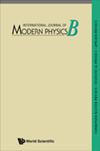The effects of thermal radiation and heat source/sink on the flow and heat transfer characteristics of a hybrid nanofluid over a vertical stretching cylinder: Regression analysis
IF 2.8
4区 物理与天体物理
Q2 PHYSICS, APPLIED
引用次数: 0
Abstract
Originality: A novel category of working fluids, consisting of two substantial components diffused in a conventional fluid, has been identified and investigated widely in recent years. These types of fluids are called hybrid nanofluids. Problem statement: A wide range of engineering and industrial structures, including heat-transferring components, energy production, extrusion procedures, engine cooling purposes, thermal structures, thermal exchangers, chemical procedures, manufacturing processes and hybrid power plants, have been proposed for use with nanomaterials with improved thermal properties. These nanomaterial-based applications hold the promise of improved performance and efficiency in a variety of technological and industrial processes. The heat transmission and magnetohydrodynamic stagnation significance flow of hybrid nanofluids Fe 3 O 4 –ZrO 2 and Fe 3 O 4 /water, the form factor of a stretched cylinder under the influence of heat production, nonlinear thermal radiation and nanoparticle volume fractions have been investigated in this study. Methodology: Utilizing proper similarity transformations, the processes of partial differential equations are further transformed into nondimensional solutions of ordinary differential equations. The bvp4c approach is employed to achieve a numerical solution. The flow and temperature profiles are displayed as a function of the contained factors. Graphs show the effects of changing the physical characteristics involved. Tables emphasize the skin friction factor and Nusselt numbers. Results: The temperature profile of fluids diminished due to an increment in the values of the temperature relaxation parameter and Eckert number. When the porosity factor is increased the temperature of fluids is improved. The effects of streamlines for various components are discussed. The 3D surface, contour plots and residual plots for various factors have also been investigated. Applications: Hybrid nanofluids have the potential to improve heat transfer efficiency in a variety of technical applications, including cooling structures, heat exchangers and thermal energy storage systems.热辐射和热源/热源对垂直拉伸圆柱体上混合纳米流体流动和传热特性的影响:回归分析
原创性:一种新型的工作流体,由两种基本成分在常规流体中扩散组成,近年来得到了广泛的研究。这些类型的流体被称为混合纳米流体。问题陈述:广泛的工程和工业结构,包括传热部件、能源生产、挤压过程、发动机冷却目的、热结构、热交换器、化学过程、制造过程和混合动力装置,已被提议用于具有改进热性能的纳米材料。这些基于纳米材料的应用有望在各种技术和工业过程中提高性能和效率。本文研究了混合纳米流体Fe - 2o_3和Fe - 2o_3 /水的传热和磁流体滞止显著流动,以及受产热、非线性热辐射和纳米颗粒体积分数影响的拉伸圆柱体形状因子。方法:利用适当的相似变换,将偏微分方程的过程进一步转化为常微分方程的无量纲解。采用bvp4c方法进行数值求解。流量和温度曲线显示为包含因素的函数。图表显示了改变所涉及的物理特性的影响。表格强调皮肤摩擦系数和努塞尔数。结果:随着温度松弛参数和Eckert数的增大,流体的温度分布减小。随着孔隙度系数的增大,流体的温度也随之提高。讨论了流线对不同组分的影响。研究了各种因素的三维曲面、等高线图和残差图。应用:混合纳米流体在各种技术应用中具有提高传热效率的潜力,包括冷却结构、热交换器和热能储存系统。
本文章由计算机程序翻译,如有差异,请以英文原文为准。
求助全文
约1分钟内获得全文
求助全文
来源期刊

International Journal of Modern Physics B
物理-物理:凝聚态物理
CiteScore
3.70
自引率
11.80%
发文量
417
审稿时长
3.1 months
期刊介绍:
Launched in 1987, the International Journal of Modern Physics B covers the most important aspects and the latest developments in Condensed Matter Physics, Statistical Physics, as well as Atomic, Molecular and Optical Physics. A strong emphasis is placed on topics of current interest, such as cold atoms and molecules, new topological materials and phases, and novel low dimensional materials. One unique feature of this journal is its review section which contains articles with permanent research value besides the state-of-the-art research work in the relevant subject areas.
 求助内容:
求助内容: 应助结果提醒方式:
应助结果提醒方式:


